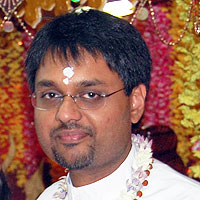At the recently concluded International Gita Forum of SWAHA, many were the perspectives projected on the theme, “Principles of Bhagavad Gita on Individual Growth and Nation Building”. Emerging from the discussions, in diverse ways, was the fact that the universality of this text lies in its philosophical underpinnings and its comprehensive value to application. The power of its message with its transformational appeal, its call to humanity to honour one’s duty and its compass needle pointing to the direction of “swatantrataa” or independence, has stood the test of time, having endured for 5,000 years.
The Gita itself, taken from the Bheeshma Parva of the Mahabhaarat, is comprised of 18 chapters and 700 verses. Both these numbers, 18 and 700, hold much significance according to the Hindu numerology system.
The sum of the digits (1+8) that comprise the number 18, is 9, which is a mystical number and which signifies the world of objects. The nine components of this world of objects are: A) The three modes of existence, namely, time, place and causation; B) three modes of “prakriti” (nature), namely, “satva” (truth), “rajas” (materialism) and “tamas” (inertia) and C) the three main functions that affect all life, namely, creation, sustenance and dissolution. By the study of Bhagavad Gita, the individual rises above these components of the world of objects and identifies with one’s own true nature, that of divinity.
The number 7 which is the sum of the digits that comprise 700, is the number of creation. Again, by intense study of this text, by deep analysis and sincere application, we recreate ourselves. We rise above the worldly attributes with which we identify our lives and regain our own divinity. This divinity is the state of “swatantrataa”, the state of true freedom or self-realization. In this state we can be said to be akin to Bhagavan, the One who possesses the six “bhag” or supreme virtues. These are: strength, omniscience, knowledge, dispassion, dutifulness and radiance.
Indeed, the Lord exhorts man to acquire the qualities of Bhagavan, to attain true freedom, to come to Him, in the following verse : “Give your mind to Me, be devoted to me, worship Me and bow down to Me. Doing so, you will come to Me. I truly promise you, for you are exceptionally dear to me.” Chap. 18. Vs 65.
The truly independent person, the self-realized individual, having transcended the “tattvas”, is one whose entire life is sanctified and through relationships and interactions, inspires others by one’s benevolence, the purity of intent of actions, empathy and strength of character. By example such an individual stimulates right action, encouraging personal uplift in others. He creates the sparks of improvement, devotion to duty and the pursuit of a dharmic lifestyle in others. In reality, the independent individual walks along the spiritual foundation of human existence and steers others onto the route of independence. Such were some of the lessons enunciated by Bhagavan Krishna in Bhagavad Gita.
By the daily study of the Gita one is not only afforded the opportunity to perform one’s “nitya karma” (daily duty) of “Rishi yagya” but one is also guided towards the route of true independence.


